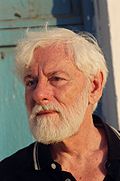I was taken by surprise. "Why would that be?" I asked.
"Well, for 62 years you have advocated the establishment of a Palestinian state next to Israel, and here it comes!"
"If I were a Palestinian, I would probably be happy," I said, "But as an Israeli, I am rather sad."
LET ME explain.
I came out of the 1948 war with four solid convictions:
- There exists a Palestinian people, though the name Palestine had been wiped off the map.
- It is with this Palestinian people that we must make peace.
- Peace will be impossible unless the Palestinians are allowed to set up their state next to Israel.
- Without peace, Israel will not be the model state we had been dreaming about in the trenches, but something very different.
While recovering from my wounds and still in uniform, I met with several young people, Arabs and Jews, to plot our course. We were very optimistic. Now everything seemed possible.
What we were thinking about was a great act of fraternization. Jews and Arabs had fought each other valiantly, each fighting for what they considered their national rights. Now the time had come to reach out for peace.
The idea of peace between two gallant fighters after the battle is as old as Semitic culture. In the epic written more than 3000 years ago, Gilgamesh, king of Uruk (in today's Iraq) fights against the wild Enkidu, his equal in strength and courage, and after the epic fight they become blood brothers.
We had fought hard and had won. The Palestinians had lost everything. The part of Palestine that had been allotted by the UN to their state had been gobbled up by Israel, Jordan and Egypt, leaving nothing for them. Half the Palestinian people had been driven from their homes and become refugees.
That was the time, we thought, for the victor to stun the world with an act of magnanimity and wisdom, offering to help the Palestinians to set up their state in return for peace. Thus we could forge a friendship that would last for generations.
18 years later I brought this vision up again in similar circumstances. We had won a stunning victory against the Arab armies in the Six-Day war, the Middle East was in a state of shock. An Israeli offer to the Palestinians to establish their state would have electrified the region.
I AM telling this story (again) in order to make one point: when the "Two-State Solution" was conceived for the first time after 1948, it was as an idea of reconciliation, fraternization and mutual respect.
We envisaged two states living closely together, with borders open to the free movement of people and goods. Jerusalem, the joint capital, would symbolize the spirit of the historic change. Palestine would become the bridge between the new Israel and the Arab world, united for the common good. We spoke of a "Semitic Union" long before the European Union became a reality.
When the Two-State Solution made its extraordinary march from the vision of a handful of outsiders (or crazies) to a world-wide consensus, it was this context in which it was viewed. Not a plot against Israel, but the only viable basis for real peace.
This vision was firmly rejected by David Ben-Gurion, then the undisputed leader of Israel. He was busy distributing new Jewish immigrants across the vast areas expropriated from the Arabs, and he did not believe in peace with the Arabs anyhow. He set the course that successive Israeli governments, including the present one, have followed ever since.
On the Arab side, there was always support for this vision. Already at the Lausanne Conference in 1949, an unofficial Palestinian delegation appeared and secretly offered to start direct negotiations, but they were roughly rebuffed by the Israeli delegate, Eliyahu Sasson, on direct orders from Ben-Gurion (as I heard from him later).
(Note: You can view every article as one long page if you sign up as an Advocate Member, or higher).





